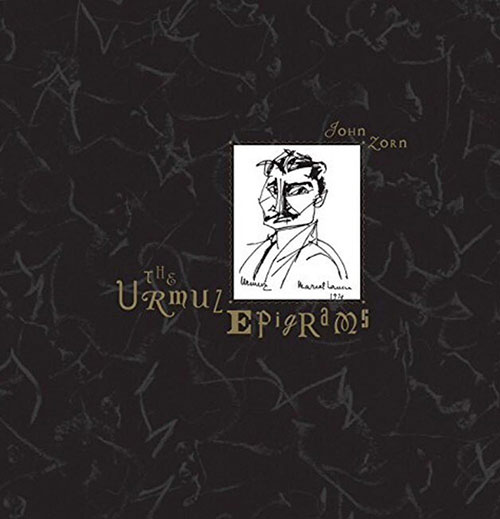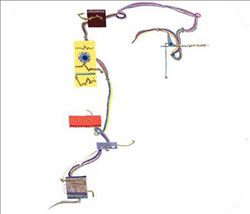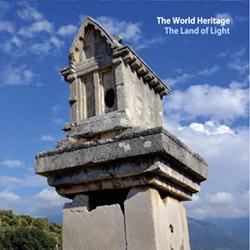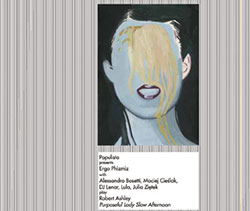
With the collaboration of percussionist Ches Smith, John Zorn creates a magnificent and dreamlike series of parallel tracks, a "modern reconstruction" and a set of faux 78rpm albums purportedly from 1923, as an homage to pre-dada absurdist, Romanian writer Urmuz (Demetru Dem), using the studio and card-file composition to create a bizarre and astonishing set of 8 x 2 pieces.
Out of Stock
Quantity in Basket: None
Log In to use our Wish List
Shipping Weight: 2.00 units
Sample The Album:
Ches Smith-drums, percussion, vibraphone, glockenspiel, voice
John Zorn-saxophone, piano, organ, sound effects, guitar, bass, game calls, percussion, voice
Click an artist name above to see in-stock items for that artist.
UPC: 702397835820
Label: Tzadik
Catalog ID: CD-TZA-8358
Squidco Product Code: 25473
Format: CD
Condition: New
Released: 2018
Country: USA
Packaging: Cardboard sleeve, sealed
Recorded at EastSide Sound, in NYC.. on September 27th and 28th, 2017.
"With The Urmuz Epigrams Zorn returns to his roots, using the recording studio as an instrument to create an intensely personal suite of compositions in the style of his legendary File Card compositions and Zoetropes. Dedicated to the visionary Romanian writer Urmuz whose small, scattered body of work predated Dadaism by decades, The Urmuz Epigrams is a suite of surrealistic miniatures more akin to philosophical aphorisms than actual music. The pieces are presented here in two iterations, as a set of "rare 78rpm records" complete with surface scratches and limited dynamic range, and as a modern reconstruction of same with the full blown studio sound presented in all its perplexing glory. Some of the craziest music in the Zorn catalog!"-Tzadik
"Urmuz (Romanian pronunciation: [urˈmuz], pen name of Demetru Dem. Demetrescu-Buzău, also known as Hurmuz or Ciriviș, born Dimitrie Dim. Ionescu-Buzeu; March 17, 1883 - November 23, 1923) was a Romanian writer, lawyer and civil servant, who became a cult hero in Romania's avant-garde scene. His scattered work, consisting of absurdist short prose and poetry, opened a new genre in Romanian letters and humor, and captured the imagination of modernists for several generations. Urmuz's Bizarre (or Weird) Pages were largely independent of European modernism, even though some may have been triggered by Futurism; their valorization of nonsense verse, black comedy, nihilistic tendencies and exploration into the unconscious mind have repeatedly been cited as influential for the development of Dadaism and the Theatre of the Absurd. Individual pieces such as "The Funnel and Stamate", "Ismaïl and Turnavitu", "Algazy & Grummer" or "The Fuchsiad" are parody fragments, dealing with monstrous and shapeshifting creatures in mundane settings, and announcing techniques later taken up by Surrealism.
Urmuz's biography between his high school eccentricity and his public suicide remains largely mysterious, and some of the sympathetic accounts have been described as purposefully deceptive. The abstruse imagery of his work has produced a large corpus of diverging interpretations. He has notably been read as a satirist of public life in the 1910s, an unlikely conservative and nostalgic, or an emotionally distant esotericist.
In Urmuz's lifetime, his stories were only acted out by his thespian friend George Ciprian and published as samples by Cuget Românesc newspaper, with support from modernist writer Tudor Arghezi. Ciprian and Arghezi were together responsible for creating the link between Urmuz and the emerging avant-garde, their activity as Urmuz promoters being later enhanced by such figures as Ion Vinea, Geo Bogza, Lucian Boz, Sașa Pană and Eugène Ionesco. Beginning in the late 1930s, Urmuz also became the focus interest for the elite critics, who either welcomed him into 20th-century literature or dismissed him as a buffoonish impostor. By then, his activity also inspired an eponymous avant-garde magazine edited by Bogza, as well as Ciprian's drama The Drake's Head."-Wikipedia
Get additional information at Wikipedia
Artist Biographies
• Show Bio for Ches Smith "Born in San Diego, CA and raised in Sacramento, Ches Smith came up in a scene of punks and metal musicians who were listening to and experimenting with jazz and free improvisation. He studied philosophy at the University of Oregon before relocating to the San Francisco Bay area in 1995. After a few years of playing with obscure bands and intensive study with drummer / educator Peter Magadini, he enrolled in the graduate program at Mills College in Oakland at the suggestion of percussionist William Winant. There he studied percussion, improvisation, and composition with Winant, Fred Frith, Pauline Oliveros and Alvin Curran. One of Winant's first "assignments" for Ches was to sub in his touring gig at the time, Mr. Bungle (here he met bassist / composer Trevor Dunn who would later hire him for the second incarnation of his Trio-Convulsant). During his time at Mills, Ches co-founded two bands: Theory of Ruin (with Fudgetunnel / Nailbomb frontman Alex Newport), and Good for Cows (w/ Nels Cline Singers' Devin Hoff). He currently performs and records with Xiu Xiu, and Secret Chiefs 3. He has also performed with Ben Goldberg, Annie Gosfield, Wadada Leo Smith, John Tchicai, Fred Frith, and Trevor Dunn. In addition to Ceramic Dog, he also leads his two of his own projects, Congs for Brums and These Arches. He currently spends his time between Los Angeles, San Francisco and Brooklyn." ^ Hide Bio for Ches Smith • Show Bio for John Zorn "John Zorn (born September 2, 1953) is an American composer, arranger, producer, saxophonist, and multi-instrumentalist with hundreds of album credits as performer, composer, and producer across a variety of genres including jazz, rock, hardcore, classical, surf, metal, klezmer, soundtrack, ambient, and improvised music. He incorporates diverse styles in his compositions which he identifies as avant-garde or experimental. Zorn was described by Down Beat as "one of our most important composers". Zorn established himself within the New York City downtown music movement in the mid-1970s performing with musicians across the sonic spectrum and developing experimental methods of composing new music. After releasing albums on several independent US and European labels, Zorn signed with Elektra Nonesuch and received wide acclaim with the release of The Big Gundown, an album reworking the compositions of Ennio Morricone. He attracted further attention worldwide with the release of Spillane in 1987, and Naked City in 1989. After spending almost a decade travelling between Japan and the US he made New York his permanent base and established his own record label, Tzadik, in the mid-1990s. Tzadik enabled Zorn to maintain independence from the mainstream music industry and ensured the continued availability of his growing catalog of recordings, allowing him to prolifically record and release new material, issuing several new albums each year, as well as promoting the work of many other musicians. Zorn has led the hardcore bands Naked City and Painkiller, the klezmer/free jazz-influenced quartet Masada, composed over 600 pieces as part of the Masada Songbooks that have been performed by an array of groups, composed concert music for classical ensembles and orchestras, and produced music for opera, sound installations, film and documentary. Zorn has undertaken many tours of Europe, Asia, and the Middle East, often performing at festivals with many other musicians and ensembles that perform his diverse output. Zorn's compositions cross many genres and he has stated "All the various styles are organically connected to one another. I'm an additive person-the entire storehouse of my knowledge informs everything I do. People are so obsessed with the surface that they can't see the connections, but they are there." For Zorn "Composing is more than just imagining music-it's knowing how to communicate it to musicians. And you don't give an improviser music that's completely written out, or ask a classical musician to improvise. I'm interested in speaking to musicians in their own languages, on their own terms, and in bringing out the best in what they do. To challenge them and excite them." " ^ Hide Bio for John Zorn
4/24/2024
Have a better biography or biography source? Please Contact Us so that we can update this biography.
4/24/2024
Have a better biography or biography source? Please Contact Us so that we can update this biography.
Track Listing:
1. Disgusted with Life 2:48
2. The Piano Lid Serves As a Wall 3:52 3. With Wet Clothes and Disheveled Hair He Wandered in the Dead of Night in Search of Shelter 3:02
4. Then Again, Who Amongst Us Can Complain 3:40
5. A Rain of Threats and Screams 3:43
6. The Pelican or the Pelicaness 3:06
7. After That the Funnel Became a Symbol 2:55
8. Desperate from Having Been Left Without a Bladder 1:28
9. Disgusted with Life 2:50
10. The Piano Lid Serves As a Wall 3:56
11. With Wet Clothes and Disheveled Hair He Wandered in the Dead of Night in Search of Shelter 3:05
12. Then Again, Who Amongst Us Can Complain 3:48
13. A Rain of Threats and Screams 3:50
14. The Pelican or the Pelicaness 3:11
15. After That the Funnel Became a Symbol 2:57
16. Desperate from Having Been Left Without a Bladder 1:20
Tzadik
Compositional Forms
Electro-Acoustic
Electroacoustic Composition
Sound, Noise, &c.
NY Downtown & Metropolitan Jazz/Improv
Zorn. John
Staff Picks & Recommended Items
New in Experimental & Electronic Music
Search for other titles on the label:
Tzadik.











